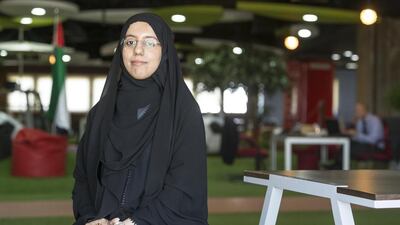DUBAI // Almost two thirds of private pupils are at schools rated “good” or better, up from less than half in the last academic year.
And for the first time, more than half of Emirati private school pupils are receiving education ranging from good to outstanding.
The latest annual report from the Knowledge and Human Development Authority shows 10 schools improved their rankings this year.
Eight were raised from acceptable to good by the Dubai Schools Inspections Bureau, one from good to very good, and one from weak to acceptable.
But three schools were downgraded from acceptable to weak and one dropped from good to acceptable.
“We have 64 per cent of our students now attending schools rated good or above, which is good news to us as it shows the collaboration among private schools in Dubai,” said Fatma Belrehif, executive director of the inspections bureau.
The report for this academic year is based on inspections of 159 private schools out of 185 in Dubai. These represent 263,051 pupils from a total of 273,599.
Sixteen schools were rated outstanding, 14 very good, 69 good, 50 acceptable and 10 weak.
Eleven schools were inspected for the first time, with six classed as good, four acceptable and one weak.
Abdulla Al Karam, director general of the education regulator, said that although he was delighted with the improvements he was striving for even more in future.
“We are grateful and happy with the improvements we have seen in the nine years we have been conducting inspections,” Mr Al Karam said.
“Everyone is benefiting, especially parents and children who have a wider choice in quality schooling.”
The report found 54 per cent of the 32,103 Emirati pupils in Dubai are in good or better schools, compared with 46 per cent last year.
Of those schools, 63 per cent teach the US curriculum, 21 per cent British, 7 per cent Ministry of Education and 5 per cent the International Baccalaureate.
“The majority of private schools [61 per cent] operate a level of provision which is good or better,” said the report.
This compares with 48 per cent rated as good or better in the 2015-2016 report.
There was also wide improvement in the provision and education for children with special needs.
“Despite a significant improvements in this area, an urgency for action remains,” said the report. “Nearly 40 per cent of private schools in Dubai continue to use approaches that restrict outcomes for students with special education needs and disabilities.”
Sixty-six per cent of schools met or exceeded National Agenda targets in science, maths and English.
Pupils are also making steady improvements in core subjects, with 62 per cent making at least good progress in Islamic education.
Progress in English has also been noticeable, with 74 per cent of pupils making good or better progress, compared with 44 per cent in 2008.
But Arabic continues to lag, with 51 per cent making acceptable or weak progress.
Mathematics and the sciences have each had 72 per cent making good or better progress.
Simon O’Connor is principal of Jumeirah College, which has been ranked as outstanding.
“Over the past year we have had the opportunity to work with the authority’s Abundance Group,” Mr O’Connor said.
“Working with Jumeirah Primary School, we’ve been supporting Emirates English Speaking School in such areas as assessment and leadership development.
“As is always the case when linking with colleagues from different contexts, this has been both fascinating and rewarding.
“We have learnt a huge amount, as well as helping another school to develop its practice. I am very hopeful that this arrangement will continue to develop in the future.”
Emily Jardine, of whichschooladvisor.com, said the report highlighted the importance of strong leadership.
“It is critical right now that schools continue to invest in high quality leadership and teaching,” Ms Jardine said.
“The concern right now for parents is fees and the DSIB reports are giving parents more choice and a greater understanding of Dubai’s educational landscape.
“However, Dubai’s education landscape is still competitive and it’s this pressure from parents and from the KHDA that drives the quality of education.
“Even though there is more choice, every parent wants to send their child to the best school and the authority clearly believes that providing choice is in the best interests of parents.”
nhanif@thenational.ae
Download the full report:

